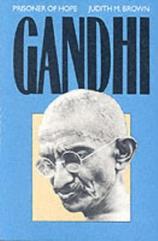
In Judith Brown's Gandhi: Prisoner of Hope, revered political leader and social reformer Mahatma Gandhi wrestles with numerous Indian crises of modernity, from early battles against racism to the violent sunder of the Indian subcontinent into diverse new nations. Born in India but trained as a London barrister, Gandhi began life split between the influence of two cultures, one east and the other west. In his life in India, he entered a traditional arranged marriage while only a child, and stumbled into an early adulthood with his family's hopes upon his back. His family sent him to London to study law and secure an income suitable to his position in India's rigid caste system. He struggled to find his place in London, but achieved his family's aim and became a lawyer. Returning home, Gandhi's shyness and virtual absence of professional contacts prevented his attainment of a successful legal career in his homeland; as a consequence he traveled to South Africa for a slight commission.
The results of that journey changed his views, his life, and our world, forever.
The rank racism and writhing injustice of South African society sparked Gandhi into a career of peaceful yet rigid resistance against political and social oppression. He searched for fuel for his struggles; he found it in traditional Hindu philosophy, but also in Western ideals of equality and brotherly love; Gandhi had the audacity to insist the British empire live up to its ethos of equality, liberty, and self-government. As Gandhi fought South African injustice, he fused his influences into a wholly unique and inimitable outlook. And with that new outlook, he turned his gaze back to British India. Heeding his 'inner voice,' he reinvented Indian customs regarding family and marriage, and wholly devoted himself to the causes of a nascent Indian nation. He spurned modernization in favor of communalism, and pushed back against both capitalist and socialist economic policies. Throughout his life, Gandhi created symbolic images that riveted the imagination of the world: the furious bonfires of South African registration cards, the simple rotations of a wooden spinning-wheel, and a pilgrimage for salt on the shores of the village Dandi in defiance of British law. He ultimately perished at the end of an assassin's gun, itself an image suggesting humanity's rejection of Gandhi's pious obsession with non-violent satyagraha--truth force.
Judith Brown's biography expertly evokes the life and work of Mahatma Gandhi, the Indian nationalist leader and multi-faceted genius who introduced a new sense of social reform, political opposition, and spiritual idealism in the first half of the twentieth century. The book charts Gandhi's intellectual, political, and spiritual development throughout his life, cradle to grave. In the process she unveils not only a uniquely powerful leader, but one caught in the maelstrom of rapidly evolving and modernizing political and social environments. She thus provides a complex interpretation of her subject's mind and times.
Brown's Gandhi chose his political actions with a cultivated political instinct; but once he made a choice, he perceived that the Truth of that choice turned the selected action into a religious imperative. And until a greater religious imperative demanded that he take an alternative course of action, the Truth mired him in the political tides that naturally envelop any policy. Most political actors seem beholden to constituencies--but Gandhi was beholden to his soul, which proved no less a master. Thus, Gandhi confounded observers (Linlithgow, Wavell, even sometimes Nehru) as either an idiosyncratic charismatic leader or else a crafty Machiavel; but Brown sketches Gandhi as someone altogether human--someone possessed of a unique and ascetic blend of religion and political philosophy who forged the ultimately uncontrollable consciousness of the Indian nation.
 RSS Feed
RSS Feed